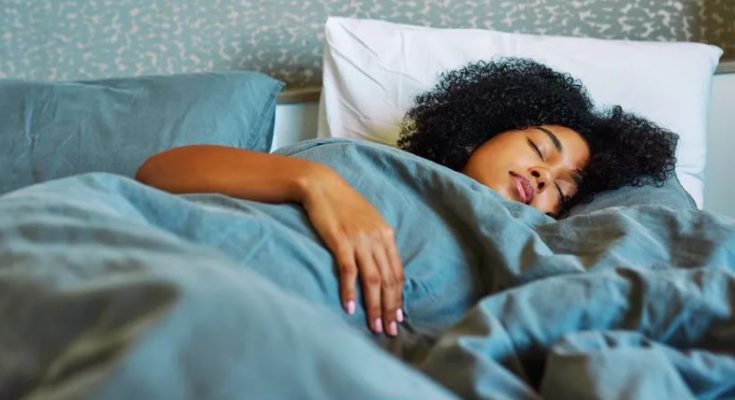From cherry juice to chamomile tea to massage therapy, here’s the bottom line from sleep experts.
You crawl into bed at a decent hour thinking tonight is the night you’re going to get your sleep back on track. Then you stare at the ceiling, eyes wide open, mind racing, with a good night’s sleep feeling more like a distant dream with every passing second.
You’re not alone.
The Centers for Disease Control and Prevention says that about 70 million Americans deal with chronic sleep problems. According to the American Academy of Sleep Medicine, up to 35 percent of adults struggle with insomnia, which means they have trouble falling asleep and/or staying asleep (at least on an occasional basis). And about 10 percent of people suffer from the longer-term type of insomnia, chronic insomnia, which means they find it difficult to get enough shut-eye at least three nights a week, for at least three months.
Once your doctor has ruled out other medical conditions that may be interfering with your sleep and given you a diagnosis of insomnia, treatment will typically include cognitive and behavioral therapy for insomnia (CBT-I), lifestyle changes, and if necessary, medication. “The most effective treatment for insomnia is CBT-I,” says Alon Avidan, MD, MPH, a professor of neurology and the director of the UCLA Sleep Disorders Center.
“CBT-I includes a number of different modalities, such as mindfulness, meditation, deep breathing exercises, stimulus control (which involves removing factors from the bedroom environment that might be perpetuating the insomnia, such as a clock or an electronic device), hypnosis, and sleep hygiene,” Dr. Avidan says. It helps retrain the brain to sleep by unlearning bad habits or thought patterns that are contributing to insomnia in the first place.
Other modalities, such as certain supplements or massage therapy, may carry the risk of interfering with other medications or treatments (or be unsafe for certain groups), so however harmless an approach might sound, it’s a good idea to let your physician know what you’re trying out (especially if you’re currently undergoing other treatments for insomnia or have another chronic health issue). The National Institutes of Health (NIH) recommends this, too.

1
Biofeedback

Biofeedback is a therapeutic approach in which you learn how to change various physiological functions (such as heart rate, breathing, and brain waves) to improve various aspects of your health and performance. It’s used for several purposes, such as helping with chronic pain, anxiety, and urinary incontinence. And there’s some evidence it can be used to help people with insomnia, too.
2
Yoga

A study review published in 2020 in BMC Psychiatryfound that yoga can significantly improve sleep and be a useful tool in helping women manage sleep problems. (The researchers noted in their paper that fewer benefits were seen among perimenopausal and post-menopausal women, as well as women with breast cancer.)
3
Hypnosis

Hypnotherapy is a mind-body practice that involves using hypnosis — a state of consciousness where a person is focused on certain ideas or images — to change brain activity and make a person more receptive to new ideas, according to Cleveland Clinic. With hypnotherapy, specific suggestions are conveyed to influence a person’s thoughts and actions. And the practice may help people with insomnia by addressing the underlying issues that are preventing you from sleeping (though it may not work for everyone).
4
Lavender

There is some evidence to support the use of lavender as a natural sleep remedy for insomnia. A study published in the Journal of Alternative and Complementary Medicine evaluated the effectiveness of using lavender essential oil before bed plus practicing other sleep hygiene strategies, compared with just practicing the sleep hygiene strategies.
5
Chamomile

While chamomile is used in many teas marketed as sleep-promoting, the evidence behind this popular sleep aid is scant. In a review published in Molecular Medicine Reports, researchers reported that the herb may have a sedative effect. The authors noted that chamomile has traditionally been used as a tea or aromatherapy oil to induce relaxation.
6
Valerian Supplements

Valerian root is usually dried and made into a tea, tablet, capsule, or tincture, according to the Sleep Foundation. Some small studies have suggested that valerian — a flowering plant — may help reduce the amount of time it takes to fall asleep and promote a better sleep experience, according to Mayo Clinic. But it’s worth noting that the herb may be unsafe for certain groups of people (including women who are pregnant or breastfeeding), and it may lead to unwanted side effects, such as headaches, dizziness, stomach problems, or sleeplessness, according to Mayo Clinic.
7
Tart Cherry Juice

Cherry juice may help promote restful slumber, because it’s thought to be naturally high in melatonin, a hormone that helps regulate your body’s sleep-wake cycles.
A small study of 11 subjects published in 2017 in the American Journal of Therapeutics found that participants with insomnia who drank tart cherry juice for two weeks increased the amount that they slept.
The Bottom Line Drinking cherry juice before bed is low risk, but if you have a condition that affects your blood sugar levels (such as prediabetes or diabetes), it’s best to discuss it with your doctor before you start.
8
Melatonin

The popularity of melatonin as a sleep aid has skyrocketed in recent years. In fact, the NIH reports that the use of melatonin supplements by adults in the United States more than quintupled between 1999 and 2018. But studies have shown that the supplement isn’t an effective solution for insomnia. Grandner agrees: “Melatonin is not recommended to treat insomnia.”
The NIH says that melatonin may provide some benefits for people with sleep disorders that are caused by an issue with the body’s internal clock, such as jet lag. “It is safe and can support healthy sleep. It is a powerful chronobiotic and can be used to treat circadian rhythm sleep-wake disorders, but it is not effective for insomnia. Many studies now show this,” Grandner explains.
The Bottom Line If you’re struggling with sleep due to traveling across time zones, jet lag, or another situation in which you’re falling asleep at a time of day other than the one you want to, consider melatonin. If your insomnia is related to something else, skip it.
9
Acupuncture

Acupuncture involves inserting tiny needles into specific points on the body. The Mayo Clinic says it’s most commonly used to treat pain, but some research shows the treatment may also help with sleep.
A review of 46 clinical trials that included 3,811 people with insomnia found that acupuncture significantly improved sleep quality, compared with no treatment or sham acupressure. Investigators also found that treating insomnia with conventional therapies plus acupuncture was more effective than using the standard treatment alone.
A 2013 study that included 180 participants with primary insomnia found that acupuncture was more effective at improving sleep quality and daytime functioning than the medicine estazolam or sham acupuncture.
The NIH says acupuncture is generally a safe therapy when it’s done by an experienced and trained practitioner. But it’s a good idea to discuss this treatment with your doctor before having it.
The Bottom Line Research suggests that acupuncture alone or used alongside other treatments for insomnia may help with sleep.
10
Massage

A massage might do more than loosen tight muscles. In a study published in 2022 in Menopause, researchers analyzed 70 postmenopausal women. They found that the participants who had a 20-minute foot massage every day for a week reported sleeping an hour more per night, compared with the control group.
And a study published in the Asian Pacific Journal of Cancer Prevention found that back massages helped caregivers of cancer patients sleep better, while also decreasing stress hormones, blood pressure, pulse rates, and anxiety symptoms.
The Bottom Line Goetting says that massage (done by you or someone else) is most effective if it’s done regularly as part of a bedtime routine. “The massage itself is good, but it’s much much better if it’s part of winding down. If it’s random and done during the day, it means less,” he says.


